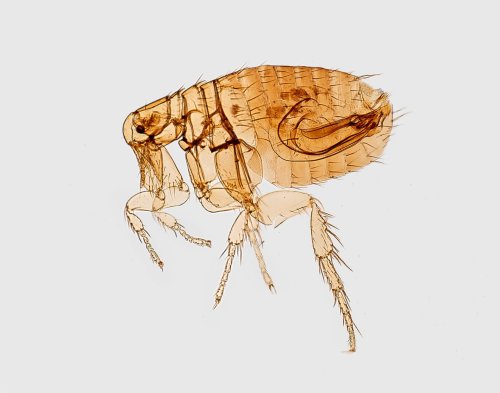Why is my dog so itchy? Help with your dogs itchy skin
Have you noticed that your dog has itchy skin and scratches a lot? It’s a situation in which many dog owners find themselves. There are numerous reasons dogs can have—from simple ones that can be solved easily at home to more complicated ones that require professional help. In this article, we explore some reasons why your dog is itchy.
Healthy Coat and Skin

Let's learn more about dogs' skin health to recognise changes in the coat and skin that could cause your dog to feel itchy. First, we will consider what a healthy coat and skin look like.
As with humans, our dogs' skin is the largest organ in their body, occupying 10% to 15% of the total body weight. The skin consists of several layers: the surface layer covered with hair; the hypodermis, just below the base layer, mainly consisting of fat; the dermis; and the deepest layer is called the epidermis.
A healthy coat and skin indicate that the dog is in good health; it also plays an essential role in maintaining their health. The primary functions of healthy skin and fur are:
Protection against external objects
Resist chemicals entering the body.
Performs a vital role in protecting the immune system
Insulates the body, thus aiding in the regulation of body temperature
Healthy coats should be shiny, free from tangles, dirt and debris, and not break easily. There are several types of coats that dogs can have; some are naturally coarse and wirey, some are curly, and others are smooth. Whatever kind of coat your breed of dog has, it should not be greasy, nor should the skin be flaky or bumpy, as these indicate health concerns.
When both coat and skin are healthy, they should not be itchy.
Other Symptoms
There are other signs that often accompany scratching and indicate a decline in coat and skin health. If you notice your pet is constantly scratching themselves, it's a good idea to observe a bit closer, looking for other indicators that their pet's health has declined.
One of the main accompanying symptoms is increased shedding, other than the typical seasonal shed. This may be especially apparent when bald patches appear on the dog's coat. Irritated or damaged skin can affect the hair follicle, resulting in an area where the hair doesn't grow at the same rate as it falls out or bald spots where the hair doesn't grow back at all.
Red skin may also be seen in areas affected by hair loss or itchiness. This redness is often a sign of inflammation due to an allergy or another skin irritant. In addition to redness, inflamed skin is often hot to the touch and very sensitive for the dog.
Flaky skin is another indicator of health imbalance, so it's important to check your dog's skin and coat regularly.
External or Environmental Factors
External or environmental factors that cause scratching in dogs are usually easier to deal with because we can protect the dog from these influences by removing them or keeping them away. Below is a list of some common external factors that can cause itchy problems in dogs.
Flea Allergy Dermatitis

The most common skin diseases in dogs are flea-related skin allergies, sometimes called flea bite hypersensitivity. Although fleas can bite the dog anywhere, bites are often found on the tummy, the base of the tail and around the neck and ears.
Food Allergies
It is possible that the scratching occurs as a result of an allergy to food or some ingredient in the dogs' food. Food allergies can be caused by common food ingredients such as chicken, beef, wheat, soy, or others. An allergic reaction to food often manifests through itchy skin, paws, and ears, and in more severe cases, through vomiting and diarrhea. If you recently changed your dog's food and soon noticed scratching, remove the new food and observe whether it affects your dog's skin condition.
Household or Garden Plants and Chemicals

As is often the case with humans, some herbs and other plants can cause an allergic reaction in dogs. After contact with an allergen, whether it is an outdoor plant or one you have planted in a pot in your home, the dog's skin will often react with redness and inflammation, which will cause discomfort and scratching. Dogs can also react to the chemicals you use in the garden (for example, pesticides or herbicides), which, due to their chemical properties, can pose more severe skin infections and greater danger to general health, so always keep chemicals out of reach.
Our homes sometimes cause allergic reactions in dogs, too. Allergens inside the house can be different: lotions, detergents, and even from Volatile Organic Compounds (VOCs) that are emitted from many new furniture, aerosols, carpets, paints and fabric softeners.
Allergic reactions are not a problem that owners should solve independently but a situation requiring a vet visit. Your vet can prescribe medication that calms an allergic reaction down, then you can begin to find the causes of the allergic reaction and ways to eliminate them.
Seasonal Allergies
Seasonal allergies can be common in dogs. Allergies can begin from inhaling allergens, such as in spring, when higher pollen counts are more prevalent. But may also be triggered by a reaction to dust mites and mould spores. A dog that reacts to this type of allergen will often show scratching all over the body and even chew and rub its feet. Like other allergic reactions, this one also requires a visit to the veterinarian as soon as symptoms appear.
Mites
Mites are one of the most common causes of scratching in dogs. Ask yourself where your dog has been recently and if it has been in contact with any wildlife. The mites irritate the skin, resulting in itching, hair loss, and inflammation.
Infestations of mites can lead to mange; this is a serious medical condition that requires immediate veterinary attention. Be aware: a type of mange called sarcoptic mange caused by the Sarcoptes scabies mite is transmissible to humans. This type of mite causes one of the most uncomfortable itching diseases seen in dogs, making it extremely unpleasant. Therefore, until you are sure what is causing your dog's itching, be careful not to pick up the parasite yourself.
Bathing

Bathing a dog too often or not thoroughly rinsing off products, causing them to accumulate, can dry out the dog's skin. This removes the healthy protective oils from the skin, making the skin itchy and prone to infections. Dr Heather Peikes of Animal Allergy & Dermatology in New York City suggests that you bathe your dog when you think it's necessary; that is, when you notice that the fur is dirty or has started to smell. Some shampoos work better on an individual dog than others; however, many dogs will benefit from a gentle shampoo that doesn't include sodium lauryl sulphate.
Stressful Environment
Just as people can develop obsessive habits due to stress (such as nail biting), dogs can resort to scratching to soothe themselves when they experience anxiety or emotional disbalance. We want to keep the dog away from sources of stress for many reasons, and scratching is just one of the symptoms that can turn into a much worse condition—by continuously irritating the skin, the dog can allow bacteria to come into contact with the body and make it vulnerable to new health problems. So check to see if a stressful environment is contributing to your dogs scratching.
Internal Factors
Unlike external influences, which we can usually successfully remove or change, internal causes of a dog's itchy skin may require a more complex approach.
Dog Breed
There are dog breeds that are more prone to skin issues than others, so scratching problems will occur more often with them. Dogs like West Highland White Terriers and Staffordshire Bull Terriers are known for their skin being very reactive to changes and often have health problems with their skin. Double-coat dogs, such as German Shepherds and Golden Retrievers, may often experience itchy skin, as will dogs whose skin folds—for example, numerous brachycephalic breeds, such as Pugs and English Bulldogs, which are prone to skin infections. Finally, breeds that have long coats can often find themselves scratching more often if their coats are not well maintained.
Auto-immune Diseases
With an autoimmune disease, the immune system mistakenly attacks itself because the immune cells fail to distinguish the body's normal healthy cells from foreign cells. They try to destroy the normal tissues, thus causing illness.
One such disease is bullous pemphigoid. A bullous is a large, thin-walled sac filled with clear fluid. It usually comes with very itchy skin, large red sores, and hives that often appear before or during blistering. Although rare in dogs, this serious disease should never go under the radar, so if you notice the symptoms, take your dog to the vet immediately.
Gut Microbiome
Research in humans has shown that atopic dermatitis, accompanied by extremely heavy itching and dry skin, can be directly related to the gut microbiome. Therefore, in a 2022 article titled "Comparison of the Gut Microbiome between Atopic and Healthy Dogs—Preliminary Data," scientists investigated whether gut microbiomes also affected the skin condition of dogs. Their results showed that allergic dogs have significantly different gut microbiota compared to healthy dogs, confirming it's another internal factor that can affect scratching in your pet.
Neurologic Condition
Scratching can occur as a result of a neurological condition. One of the more well-known, although it is most often associated with only a few breeds, such as Cavalier King Charles Spaniels and Brussels Griffons, is Chiari-like malformation. This neurologic condition is characterised by abnormal growth of bone in the back of the skull, making the skull too small for the brain and leading the nervous system to abnormal processing of sensory input.
This abnormal sensation most often occurs on the back of the head and neck, which is why owners describe their dogs constantly scratching at the air without any relief (phantom scratching).
An Osteopathic Approach to Itchy Dog Skin
How can an Animal Osteopath help a dog suffering from itchy skin? The osteopath's task is to restore the normal function of all the bodily systems by encouraging good structure within the body. The Osteopathic approach is more than a hands-on manual therapy; it considers the whole patient, including internal and external influences.
When Canine Osteopaths look for the source of itching but also focus on restoring optimal health to the whole body. Since the body comprises a series of intertwined systems, the entire dog suffers when one system is diseased, so animal osteopaths focus on the bigger picture of well-being and health.
Itchy Dog: What to do About Skin Issues
So if your dog is suffering from skin issues or itchiness, you can begin by observing the conditions under which it occurs and whether it is possibly related to external influences. Any sudden changes that may indicate allergic reactions require an urgent visit to the veterinarian so that the reaction can be controlled in time before it gets more complicated. If the changes and scratching are not sudden but still persistent enough to make you worry, the best choice is again to take your dog to the vet, who will conduct tests or guide you on how to approach the problem. If emotional or psychological reasons are the trigger, then book in with an animal osteopath.
Depending on the source of the itch, treatments vary.
Topicals allow symptomatic treatment and relief and manage flare-ups. It's how, for example, mites are treated: usually by washing a dog with a specialised medicated shampoo that helps the skin get rid of parasites.
By controlling the environment that affects the repeated response in dogs. For example, if the allergens that cause scratching come from a particular food product, changing the dog's diet will be necessary to stop the allergic reaction.
Supplements can help the dog restore its body balance and strengthen its immune system. They are especially important if the veterinary examination has determined that the causes of itching are not external but rather internal factors.
Just like with humans, stress can have a surprisingly powerful effect on dogs' physical condition. For example, if you have noticed that your dog reacts by scratching to stressful situations, help your dog learn to relax deeply.





MB
2024-10-10 08:11
This article exactly what I needed to understand my dog’s persistent scratching. Thanks for this article.